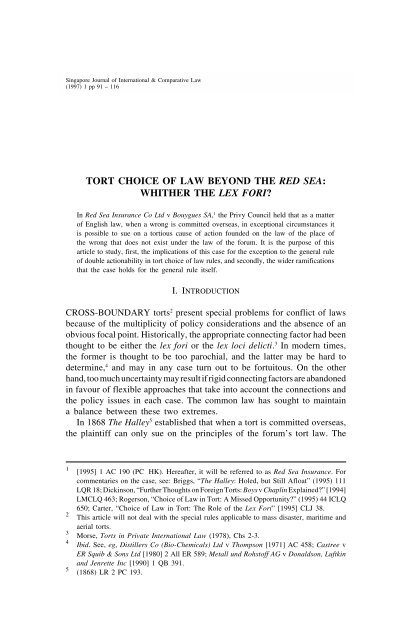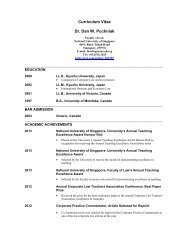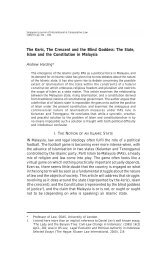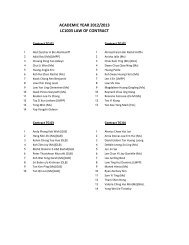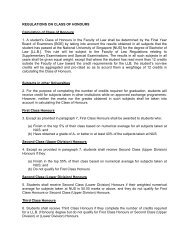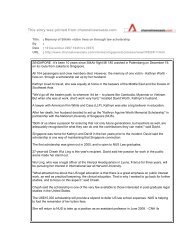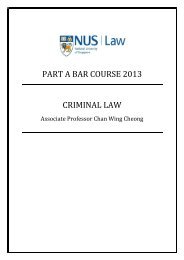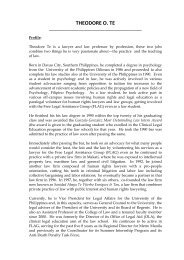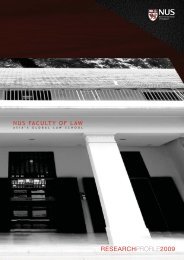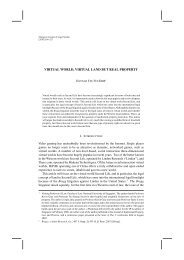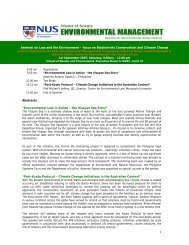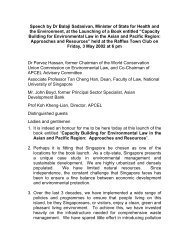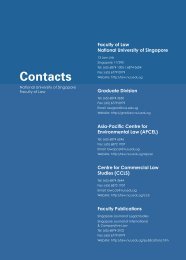TORT CHOICE OF LAW BEYOND THE RED SEA ... - Faculty of Law
TORT CHOICE OF LAW BEYOND THE RED SEA ... - Faculty of Law
TORT CHOICE OF LAW BEYOND THE RED SEA ... - Faculty of Law
You also want an ePaper? Increase the reach of your titles
YUMPU automatically turns print PDFs into web optimized ePapers that Google loves.
1 Singapore SJICL Journal Tort <strong>of</strong> International Choice <strong>of</strong> & <strong>Law</strong> Comparative Beyond <strong>Law</strong> the Red Sea: Whither the Lex Fori?<br />
(1997) 1 pp 91 – 116<br />
<strong>TORT</strong> <strong>CHOICE</strong> <strong>OF</strong> <strong>LAW</strong> <strong>BEYOND</strong> <strong>THE</strong> <strong>RED</strong> <strong>SEA</strong>:<br />
WHI<strong>THE</strong>R <strong>THE</strong> LEX FORI?<br />
In Red Sea Insurance Co Ltd v Bouygues SA, 1 the Privy Council held that as a matter<br />
<strong>of</strong> English law, when a wrong is committed overseas, in exceptional circumstances it<br />
is possible to sue on a tortious cause <strong>of</strong> action founded on the law <strong>of</strong> the place <strong>of</strong><br />
the wrong that does not exist under the law <strong>of</strong> the forum. It is the purpose <strong>of</strong> this<br />
article to study, first, the implications <strong>of</strong> this case for the exception to the general rule<br />
<strong>of</strong> double actionability in tort choice <strong>of</strong> law rules, and secondly, the wider ramifications<br />
that the case holds for the general rule itself.<br />
I. INTRODUCTION<br />
CROSS-BOUNDARY torts 2 present special problems for conflict <strong>of</strong> laws<br />
because <strong>of</strong> the multiplicity <strong>of</strong> policy considerations and the absence <strong>of</strong> an<br />
obvious focal point. Historically, the appropriate connecting factor had been<br />
thought to be either the lex fori or the lex loci delicti. 3 In modern times,<br />
the former is thought to be too parochial, and the latter may be hard to<br />
determine, 4 and may in any case turn out to be fortuitous. On the other<br />
hand, too much uncertainty may result if rigid connecting factors are abandoned<br />
in favour <strong>of</strong> flexible approaches that take into account the connections and<br />
the policy issues in each case. The common law has sought to maintain<br />
a balance between these two extremes.<br />
In 1868 The Halley 5 established that when a tort is committed overseas,<br />
the plaintiff can only sue on the principles <strong>of</strong> the forum’s tort law. The<br />
1<br />
[1995] 1 AC 190 (PC HK). Hereafter, it will be referred to as Red Sea Insurance. For<br />
commentaries on the case, see: Briggs, “The Halley: Holed, but Still Afloat” (1995) 111<br />
LQR 18; Dickinson, “Further Thoughts on Foreign Torts: Boys v Chaplin Explained?” [1994]<br />
LMCLQ 463; Rogerson, “Choice <strong>of</strong> <strong>Law</strong> in Tort: A Missed Opportunity?” (1995) 44 ICLQ<br />
650; Carter, “Choice <strong>of</strong> <strong>Law</strong> in Tort: The Role <strong>of</strong> the Lex Fori” [1995] CLJ 38.<br />
2<br />
This article will not deal with the special rules applicable to mass disaster, maritime and<br />
aerial torts.<br />
3<br />
Morse, Torts in Private International <strong>Law</strong> (1978), Chs 2-3.<br />
4<br />
Ibid. See, eg, Distillers Co (Bio-Chemicals) Ltd v Thompson [1971] AC 458; Castree v<br />
ER Squib & Sons Ltd [1980] 2 All ER 589; Metall und Rohst<strong>of</strong>f AG v Donaldson, Luftkin<br />
and Jenrette Inc [1990] 1 QB 391.<br />
5<br />
(1868) LR 2 PC 193.<br />
91
92 Singapore Journal <strong>of</strong> International & Comparative <strong>Law</strong> (1997)<br />
defendants, while navigating Belgian waters, were compelled by Belgian<br />
law to employ a pilot, whose negligence caused damage to the plaintiffs.<br />
The defendants were vicariously liable for the acts <strong>of</strong> their compulsory pilot<br />
by the lex loci delicti but not the lex fori. 6 Selwyn LJ, delivering the judgment<br />
<strong>of</strong> the Privy Council, sitting on appeal from the High Court <strong>of</strong> Admiralty,<br />
dismissed the action because the defendant was not liable under English<br />
law.<br />
Two years later, Phillips v Eyre 7 demonstrated the relevance <strong>of</strong> the lex<br />
loci delicti in addition to the lex fori. The action was for assault and false<br />
imprisonment committed in Jamaica. These torts were recognised in both<br />
England and Jamaica, but a statute had been passed in Jamaica that had<br />
retrospectively validated the defendant’s acts. Willes J dismissed the plaintiff’s<br />
action because, although the requirements <strong>of</strong> English tort law had been met,<br />
the defendant’s acts were justifiable by Jamaican law. His Lordship said:<br />
As a general rule, in order a found a suit in England for a wrong alleged<br />
to have been committed abroad, two conditions must be fulfilled. First,<br />
the wrong must be <strong>of</strong> such a character that it would have been actionable<br />
if committed in England; ... Secondly, the act must not have been<br />
justifiable by the law <strong>of</strong> the place where it was done. 8<br />
In 1971, the House <strong>of</strong> Lords had to interpret this statement. In Boys<br />
v Chaplin, 9 the plaintiff and defendant, both British military servicemen<br />
posted to Malta, were involved in a road accident in Malta caused by the<br />
negligence <strong>of</strong> the defendant. The plaintiff could sue the defendant in tort<br />
by the laws <strong>of</strong> both England and Malta. However, by English law but not<br />
by Maltese law the plaintiff could recover damages for pain and suffering<br />
and loss <strong>of</strong> future earnings. The question before the House <strong>of</strong> Lords was<br />
whether the plaintiff could claim these heads <strong>of</strong> damages.<br />
All their Lordships accepted Willes J’s statement <strong>of</strong> law in Phillips v<br />
Eyre as authoritative. There was unanimity that the action, following The<br />
Halley, must be tested by the substantive law <strong>of</strong> the forum but the unanimity<br />
ended there. Lord Pearson and Lord Donovan allowed recovery on the basis<br />
that the reference to the lex loci delicti was only to establish that the act<br />
was not innocent by that law. Lord Donovan alternatively relied on the<br />
6<br />
For a survey <strong>of</strong> compulsory pilotage laws <strong>of</strong> the early trading nations and their effect on<br />
the development <strong>of</strong> the conflict <strong>of</strong> laws, see: Bederman, “Compulsory Pilotage, Public Policy,<br />
and the Early Private International <strong>Law</strong> <strong>of</strong> Torts” (1990) 64 Tulane LR 1033.<br />
7<br />
(1870) LR 6 QB 1.<br />
8<br />
Ibid, at 28-29.<br />
9<br />
[1971] AC 356. McGregor, “The International Accident Problem” (1970) 33 MLR 1; Briggs,<br />
“What did Boys v Chaplin decide?” (1983) 12 Anglo Am LR 237.
1 SJICL<br />
Tort Choice <strong>of</strong> <strong>Law</strong> Beyond the Red Sea: Whither the Lex Fori?<br />
characterisation <strong>of</strong> the issue <strong>of</strong> recovery for heads <strong>of</strong> damages as procedural<br />
and thereby governed by the lex fori. Lord Wilberforce, Lord Hodson and<br />
Lord Guest required civil actionability by lex loci delicti as well, but while<br />
Lord Wilberforce and Lord Hodson allowed recovery by the way <strong>of</strong> an<br />
exceptional application <strong>of</strong> the lex fori to displace the lex loci delicti because<br />
the double actionability test failed, Lord Guest circumvented the rule<br />
altogether by a procedural classification <strong>of</strong> the issue.<br />
In the shadow cast by this decision, the received wisdom in England<br />
has been that Lord Wilberforce’s reasoning represented the common law<br />
position. 10 In Lord Wilberforce’s view, the tension between certainty and<br />
flexibility was to be resolved into a general rule <strong>of</strong> double actionability<br />
with a flexible exception:<br />
I would, therefore, restate the basic rule <strong>of</strong> English law with regard<br />
to foreign torts as requiring actionability as a tort according to English<br />
law, subject to the condition that civil liability in respect <strong>of</strong> the relevant<br />
claim exists as between the actual parties under the law <strong>of</strong> the foreign<br />
country where the act was done. 11<br />
His Lordship added that this general rule should be applied in most cases,<br />
but there was a flexible exception which could only be invoked where there<br />
are “clear and satisfying grounds” for not applying the general rule. 12 In<br />
relation to the exception, the specific issue must be segregated and tested<br />
to see, in respect <strong>of</strong> that issue, which law bears the closest and most significant<br />
relationship with the occurrence and the parties. 13<br />
II. <strong>RED</strong> <strong>SEA</strong> INSURANCE CO LTD V BOUYGUES SA<br />
In this case, the respondents (plaintiffs), none <strong>of</strong> whom were from the forum<br />
(Hong Kong), were all engaged in a construction project in Saudi Arabia.<br />
The respondents can be conveniently divided into three groups. The first<br />
group comprised the main contractors for the project, the second group<br />
consisted <strong>of</strong> suppliers <strong>of</strong> building materials, and members <strong>of</strong> the third group<br />
were the consultants. The appellant (defendant), incorporated in Hong Kong<br />
with its head <strong>of</strong>fice in Saudi Arabia, was the insurer <strong>of</strong> the building works.<br />
10 See, eg, Dicey & Morris, Conflict <strong>of</strong> <strong>Law</strong>s (12th ed, 1993), Rule 203; Cheshire & North,<br />
Private International <strong>Law</strong> (12th ed, 1992), Ch 20; Church <strong>of</strong> Scientology <strong>of</strong> California v<br />
Commissioner <strong>of</strong> the Metropolitan Police (1976) Sol Jo 690; Coupland v Arabian Gulf Oil<br />
Co [1983] 2 All ER 434; Sayers v International Drilling Co NV [1971] 1 WLR 1176.<br />
11 Supra, note 9, at 389.<br />
12 Supra, note 9, at 391.<br />
13 Supra, note 9, at 391-392.<br />
93
94 Singapore Journal <strong>of</strong> International & Comparative <strong>Law</strong> (1997)<br />
The appellant was resisting a claim from the respondents in respect <strong>of</strong><br />
structural damage to the building works. Inter alia, it denied that the second<br />
group <strong>of</strong> respondents were parties to the insurance contract, 14 and counterclaimed<br />
against them in tort.<br />
The specific issue before the Privy Council was whether the appellant<br />
could amend its pleadings to include a counterclaim <strong>of</strong> an alleged direct<br />
cause <strong>of</strong> action in tort against the second group <strong>of</strong> respondents in negligence<br />
for supplying defective materials to the other respondents in the course <strong>of</strong><br />
the construction, thereby causing economic loss to the appellant. This cause<br />
<strong>of</strong> action did not exist by the lex fori, but purportedly existed by the lex<br />
loci delicti. The Hong Kong Court <strong>of</strong> Appeal, 15 following its earlier decision<br />
in The Adhiguna Meranti, 16 had denied the existence <strong>of</strong> the exception on<br />
the basis that it did not represent the majority views in Boys v Chaplin<br />
and refused the amendment because the action was thereby unsustainable<br />
in law. 17<br />
The Privy Council heard the case on the basis that English law was<br />
applicable. 18 The questions as defined by the Board for decision were:<br />
(1) whether there was an exception to the double actionability rule<br />
in Boys v Chaplin;<br />
(2) whether the exception could operate to displace the lex fori in<br />
favour <strong>of</strong> the lex loci delicti; and<br />
(3) whether the exception could be applied to the entire case. All<br />
were answered affirmatively.<br />
1. Is there an exception?<br />
III. IMPLICATIONS FOR <strong>THE</strong> EXCEPTION<br />
A. The Points Addressed<br />
The Board’s acceptance that the exception formed part <strong>of</strong> English law<br />
is unsurprising. Cases after Boys v Chaplin have generally assumed its<br />
14<br />
This is significant because on the assumed facts no contractual question arises, and hence<br />
no issue <strong>of</strong> concurrent liability is involved.<br />
15<br />
16<br />
17<br />
[1993] 2 HKLR 161.<br />
[1988] 1 Lloyd’s Rep 384.<br />
The Court <strong>of</strong> Appeal had allowed an amendment in respect <strong>of</strong> a similar counterclaim framed<br />
in terms <strong>of</strong> a subrogatory right that, although it could not arise by Hong Kong law (the<br />
insurer not having paid out the monies), arguably arose under the proper law <strong>of</strong> the insurance<br />
contract (Saudi Arabian law). Nothing more will be said about this counterclaim.<br />
18<br />
Application <strong>of</strong> English <strong>Law</strong> Act (Cap 88, <strong>Law</strong>s <strong>of</strong> Hong Kong).
1 SJICL<br />
Tort Choice <strong>of</strong> <strong>Law</strong> Beyond the Red Sea: Whither the Lex Fori?<br />
existence, 19 and it has been applied recently by the High Court in Johnson<br />
v Coventry Churchill International Ltd. 20 However, in deciding that the<br />
exception is discernible from Boys v Chaplin itself, the Board was taking<br />
a liberal approach towards the interpretation <strong>of</strong> precedent. Lord Donovan<br />
had explicitly opposed it, and no support was forthcoming from Lord Guest.<br />
Lord Pearson had said in obiter that if double actionability was the rule,<br />
then an exception should be made on the facts to allow recovery. 21 It remains<br />
speculative whether the Lord Pearson was talking about the same exception<br />
as Lord Wilberforce and Lord Hodson. In the face <strong>of</strong> such divergence, it<br />
is not surprising that the Privy Council opted to resolve the issue at the<br />
level <strong>of</strong> principle, asking whether there was majority support for flexibility<br />
in the application <strong>of</strong> the double actionability rule. It found this in the<br />
judgments <strong>of</strong> Lord Wilberforce, Lord Hodson and Lord Pearson. Support<br />
in principle was also culled from the <strong>Law</strong> Commission 22 and the American<br />
<strong>Law</strong> Institute. 23<br />
In principle, if Lord Wilberforce’s double actionability formulation is<br />
accepted, then, because the requirements are so strict, 24 an exception is called<br />
for. Otherwise, there is a danger <strong>of</strong> courts manipulating other techniques<br />
in a less than satisfactory fashion to achieve desired results in particular<br />
cases. 25 The Hong Kong Court <strong>of</strong> Appeal in The Adhiguna Meranti 26 was<br />
<strong>of</strong> the opinion that the requirement <strong>of</strong> civil liability in the place <strong>of</strong> the wrong<br />
was not as strict as it was made out to be in Lord Wilberforce’s judgment, 27<br />
19<br />
See cases mentioned in supra, note 10. Contra the rejection <strong>of</strong> the exception by the Australian<br />
High Court, at least in relation to interstate torts, in McKain v RW Miller (1991) 104 ALR<br />
257.<br />
20<br />
[1992] 3 All ER 14.<br />
21<br />
Supra, note 9, at 406.<br />
22<br />
Private International <strong>Law</strong>: Choice <strong>of</strong> <strong>Law</strong> in Tort and Delict (<strong>Law</strong> Com No 193).<br />
23<br />
Second Restatement <strong>of</strong> the <strong>Law</strong>: Conflict <strong>of</strong> <strong>Law</strong>s (1969).<br />
24<br />
The defendant has a double advantage: the plaintiff must show that the defendant is liable<br />
by both laws and the defendant can excuse himself by either.<br />
25<br />
For example, the classification <strong>of</strong> heads <strong>of</strong> damages as procedural by the minority in the<br />
House <strong>of</strong> Lords in Boys v Chaplin. In Australia, the notion <strong>of</strong> procedure in this context<br />
has been pushed very far: Stevens v Head (1993) 112 ALR 7; Opeskin, “Statutory Cap on<br />
Damages in Australian Conflict <strong>of</strong> <strong>Law</strong>s” (1993) 109 LQR 533.<br />
26<br />
Supra, note 16.<br />
27<br />
Lord Hodson agreed with the lex loci delicti requirement <strong>of</strong> Lord Wilberforce. Lord Pearson<br />
and Lord Donovan, taking the Machado v Fontes [1897] 2 QB 231 approach (which was<br />
overruled by Lord Hodson and Lord Wilberforce expressly, and Lord Guest by implication),<br />
required only moral or criminal culpability. Lord Guest required double actionability, but<br />
what he meant by actionability by the lex loci delicti remains conjectural because he classified<br />
the issue out <strong>of</strong> tort choice <strong>of</strong> law rules. This particular aspect <strong>of</strong> Boys v Chaplin did not<br />
arise for consideration in Red Sea Insurance. For this reason, we have probably not heard<br />
the last <strong>of</strong> The Adhiguna Meranti, supra, note 16.<br />
95
96 Singapore Journal <strong>of</strong> International & Comparative <strong>Law</strong> (1997)<br />
and so, perhaps with some justification, 28 thought that it was unnecessary<br />
to create more uncertainty by having an exception. The exception is totally<br />
untested by Singapore law. 29 Two Malaysian tort cases have considered<br />
Boys v Chaplin, but neither are satisfactory. In one, an exception was arguably<br />
applicable, but it did not appear from the judgment to have been considered, 30<br />
and in the other, the exception appeared to have been applied, although<br />
it was not explained why the general rule had been displaced. 31 Therefore,<br />
on this point, Red Sea Insurance, as a highly persuasive authority, is welcome.<br />
2. Is there an exception to the lex fori?<br />
Red Sea Insurance gave a resounding affirmative answer. This issue was<br />
not directly addressed in Boys v Chaplin. It has been pointed out by a<br />
commentator that although Lord Hodson’s judgment is probably phrased<br />
broadly enough to comprehend an exception to the lex fori, Lord Wilberforce’s<br />
judgment does not explicitly go so far, and that many <strong>of</strong> judges in the<br />
Australian High Court in Breavington v Godleman 32 did not read the judgment<br />
to go so far. 33 However, it must be noted that Lord Wilberforce’s judgment<br />
must not be read like a statute, and that in both cases, the situation did<br />
not call for an analysis <strong>of</strong> the displacement <strong>of</strong> the lex fori. Although Lord<br />
Wilberforce at one point talked about the displacement <strong>of</strong> “foreign rules”<br />
in the operation <strong>of</strong> the exception, 34 the tenor <strong>of</strong> his Lordship’s judgment<br />
supports such an exercise. One aspect <strong>of</strong> the judgment picked up by the<br />
Privy Council in Red Sea Insurance is the need for flexibility in the operation<br />
<strong>of</strong> the exception. It is just as likely that there are cases where the lex loci<br />
delicti should apply exclusively in the interests <strong>of</strong> justice as it is that there<br />
are other cases like Boys v Chaplin where the lex fori should apply to the<br />
28<br />
At least in relation to the lex loci delicti requirement. The objection that the lex fori<br />
requirement is also too strict, however, is not met.<br />
29<br />
In fact, the only reported Singapore tort choice <strong>of</strong> law case is the High Court decision in<br />
RJ Sneddon v AG Shafe [1947] SLR 27, which applied Phillips v Eyre, supra, note 7, and<br />
so obviously did not consider the exception.<br />
30<br />
Chan Kwon Fong v Chan Wah [1977] 1 MLJ 232; Beazley, “Jurisdiction and Choice <strong>of</strong><br />
<strong>Law</strong> in Tort Conflicts” (1977) 19 Mal LR 391.<br />
31<br />
Bank Bumiputra Malaysia v Osman [1987] 1 MLJ 502; Tan, “The Carrian Carcass?” (1989)<br />
31 Mal LR 157.<br />
32<br />
(1988) 62 ALR 447.<br />
33<br />
Dickinson, supra, note 1.<br />
34<br />
Supra, note 9, at 391. Hodgson J in Coupland v Arabian Gulf Petroleum Co [1983] 2 All<br />
ER 434, in an obiter dictum, had suggested the possibility <strong>of</strong> the lex loci delicti displacing<br />
the lex fori, at least with respect to an isolated issue. See also Dicey & Morris, supra, note<br />
10, at 1499. See, however, Toohey J in Breavington v Goldleman, supra, note 32, who<br />
thought that the exception should in the interest <strong>of</strong> certainty only operate to displace the<br />
lex loci delicti in favour <strong>of</strong> the lex fori.
1 SJICL<br />
Tort Choice <strong>of</strong> <strong>Law</strong> Beyond the Red Sea: Whither the Lex Fori?<br />
exclusion <strong>of</strong> the lex loci delicti. Further, Lord Wilberforce utilised interest<br />
analysis 35 in the exception, and this analysis does not invariably lead to<br />
the application <strong>of</strong> the lex fori.<br />
This is the most important aspect <strong>of</strong> the decision in Red Sea Insurance.<br />
It is not easy to be indifferent to this development. The immediate implication<br />
is that it is now possible, in exceptional circumstances, to sue in the forum<br />
for totally foreign torts. The wider ramifications for choice <strong>of</strong> law methodology<br />
will be addressed in Parts IV and V.<br />
3. Can the exception be applied to the whole claim?<br />
Lord Wilberforce’s approach towards the application <strong>of</strong> the exception<br />
requires that each issue should be segregated and tested whether an exception<br />
was appropriate and if so, for its applicable law. This is depeçage – different<br />
laws may apply to different issues arising out <strong>of</strong> the same transaction. 36<br />
On the other hand, in Red Sea Insurance, Lord Slynn said, “In their Lordships’<br />
view the exception is not limited to specific isolated issues but may apply<br />
to the whole claim, for example where all or virtually all <strong>of</strong> the significant<br />
factors are in favour <strong>of</strong> the lex loci delicti.” 37<br />
In so far as the cause <strong>of</strong> action itself is concerned, the position is correct<br />
in principle. It is artificial to distinguish between the cause <strong>of</strong> action and<br />
other questions <strong>of</strong> liability. This aspect <strong>of</strong> the decision appears to have been<br />
pre-empted by the High Court in Johnson v Coventry Churchill International<br />
Ltd. 38 The English defendant had failed to provide a safe system <strong>of</strong> work<br />
in Germany, causing injury to its employee, the English plaintiff, there.<br />
The failure <strong>of</strong> the defendant amounted to the tort <strong>of</strong> negligence by English<br />
law, but there was no civil liability by German law because a wilful breach<br />
<strong>of</strong> duty could not be shown to satisfy German rules. The High Court applied<br />
the exception to the issue <strong>of</strong> liability itself. If necessary, it might have been<br />
possible to classify the subject matter <strong>of</strong> the exception as the issue <strong>of</strong> standard<br />
<strong>of</strong> care. Moreover, the issue in Boys v Chaplin, though characterised as<br />
whether the plaintiff could recover for particular heads <strong>of</strong> damage in a tortious<br />
claim recognised by both the forum and the place <strong>of</strong> the tort, could equally<br />
have been characterised as whether the plaintiff had a cause <strong>of</strong> action in<br />
tort with respect to the particular kinds <strong>of</strong> loss.<br />
35 Discussed in greater detail infra, Section B.3.<br />
36 This is to be differentiated from the situation where an issue in the dispute is classified<br />
as non-tortious (eg, the issue <strong>of</strong> quantum <strong>of</strong> recovery as procedural, or the issue <strong>of</strong> interspousal<br />
immunity as family law) and therefore not subject to the tort choice <strong>of</strong> law rules.<br />
37 Supra, note 1, at 207. Emphasis added.<br />
38 Supra, note 20.<br />
97
98 Singapore Journal <strong>of</strong> International & Comparative <strong>Law</strong> (1997)<br />
An ambiguity, however, arises from the passage quoted above: is there<br />
an element <strong>of</strong> discretion in the application <strong>of</strong> depeçage? On one reading,<br />
what is meant is: “Where all connecting factors for all other issues point<br />
to one law, it is possible to say that even though the factors for one issue<br />
(or perhaps a minority <strong>of</strong> issues) do not point towards that law, it (or they)<br />
may nonetheless be governed by that law.” Another interpretation is: “Since<br />
all or virtually all such factors point towards one law for every possible<br />
issue, the entire case is ex hypothesi governed by that law.” The first reading<br />
represents a departure from the strict legal approach <strong>of</strong> Lord Wilberforce<br />
towards depeçage, and gives the court some discretion to decide whether<br />
to apply depeçage to some issues that may arise at the substantive trial.<br />
The second is tautologous, and further, it is not plausible that the Board<br />
had in mind every possible issue that could have arisen from the case.<br />
There is merit in the more liberal interpretation that allows judges to<br />
refrain from applying depeçage in certain circumstances. This will give<br />
judges greater flexibility in the application <strong>of</strong> the exception. Depeçage should<br />
be applied cautiously. 39 From the point <strong>of</strong> view <strong>of</strong> justice to the parties,<br />
it is probably only in unusual cases that it would be appropriate to apply<br />
different laws to different aspects <strong>of</strong> the tort. The possibility <strong>of</strong> re-classification<br />
<strong>of</strong> certain issues, 40 and the doctrine <strong>of</strong> incorporation 41 militate<br />
against this need. This need must further be balanced against the uncertainty<br />
<strong>of</strong> depeçage in its application, and the potential result <strong>of</strong> anomalous combinations<br />
<strong>of</strong> different laws applying in a single dispute. 42<br />
B. The Open Questions<br />
1. When can the exception be invoked?<br />
The Board in Red Sea Insurance was <strong>of</strong> the tentative 43 opinion that the<br />
case was eminently one which calls for the application <strong>of</strong> the exception,<br />
because the proper law <strong>of</strong> construction contracts and the insurance contract<br />
was Saudi Arabian law, the property was owned by the Saudi Arabian<br />
39<br />
Eg, in contract choice <strong>of</strong> law, depeçage is not to be lightly inferred: Libyan Arab Foreign<br />
Bank v Bankers Trust Co [1988] 1 Lloyd’s Rep 259.<br />
40<br />
41<br />
See supra, note 36.<br />
For example, even though the standard <strong>of</strong> care may not be governed by the lex loci delicti,<br />
that law may still be relevant as datum (and not choice <strong>of</strong> law) to measure the reasonableness<br />
<strong>of</strong> the defendant’s actions.<br />
42<br />
For these reasons, the <strong>Law</strong> Commission argued against splitting the applicable law in this<br />
fashion: supra, note 22, at 27. But see infra, Part VI.<br />
43<br />
This was because the only issue before the Board was whether leave could be given in<br />
principle.
1 SJICL<br />
Tort Choice <strong>of</strong> <strong>Law</strong> Beyond the Red Sea: Whither the Lex Fori?<br />
government, and the entire construction work, the alleged breach <strong>of</strong> duty<br />
and damage, and the expense <strong>of</strong> repair took place there. On the other hand,<br />
the only connection with the forum was the fact that the appellant had been<br />
incorporated there, even though its head <strong>of</strong>fice was in Saudi Arabia. Like<br />
the two previous English cases 44 where the exception had been invoked,<br />
there is an abundance <strong>of</strong> connections with one country and a lack <strong>of</strong> connections<br />
with the other.<br />
In the light <strong>of</strong> the Board’s emphasis on the flexibility <strong>of</strong> the exception,<br />
it can only be dangerous to attempt any exhaustive guidelines on the<br />
circumstances in which the exception may be invoked. 45 One clear inference<br />
from the Red Sea Insurance decision is that the connections must be subject<br />
to cautious scrutiny. The appellant was domiciled in the forum by virtue<br />
<strong>of</strong> its incorporation there. 46 However, no weight was accorded to it, and<br />
correctly so, since that connection was in fact tenuous. It remains unclear<br />
whether it is a necessary condition for the displacement <strong>of</strong> the general rule<br />
that the contacts with the state which law is sought to be displaced are<br />
minimal, or whether it is enough that the connections with the state which<br />
law is sought to be applied by the exception are substantially stronger than<br />
the connections with the state which law is sought to be displaced. Its status<br />
as an exception suggests that the former position is to be taken. Moreover,<br />
in principle, if the general rule is well-founded, then the latter position is<br />
harder to defend for the greater uncertainty that it generates. 47 For the time<br />
being, this issue remains unresolved at common law, 48 although it may be<br />
said that no authority exists so far to support incontrovertibly the latter<br />
position.<br />
44<br />
In Boys v Chaplin, supra, note 9 (assuming that Lord Wilberforce’s reasoning represented<br />
the ratio decidendi <strong>of</strong> the decision), the only connection with Malta, apart from being the<br />
place <strong>of</strong> accident, was the fact that the parties were posted there, and in fact they were only<br />
a few days away from returning to England. In Johnson v Coventry Churchill International<br />
Ltd, supra, note 20, the plaintiff had been sent to work in the place <strong>of</strong> the tort (Germany)<br />
temporarily.<br />
45<br />
Carter (1992) 63 BYBIL 519, 531; For a fairly detailed consideration <strong>of</strong> possible scenarios<br />
where the exception may be applicable, see Dicey & Morris, supra, note 10, at 1499-1501;<br />
Morse, supra, note 3, at 285-294. Some judicial guidance can be found in Johnson v Coventry<br />
Churchill International Ltd, supra, note 20.<br />
46<br />
Dicey & Morris, supra, note 10, Rule 154.<br />
47<br />
The former position was originally proposed by the <strong>Law</strong> Commission in its Working Paper<br />
in relation to the circumstances in which it is appropriate to depart from prima facie applicable<br />
rules in favour <strong>of</strong> a contact weighing approach. It adopted the latter position in its Report.<br />
This has been criticised as an unacceptable compromise on certainty: North, Essays in Private<br />
International <strong>Law</strong> (1993), Ch 4, at 85.<br />
48<br />
The English statutory position has followed the <strong>Law</strong> Commission proposal in this respect:<br />
see infra, Part VI.<br />
99
100 Singapore Journal <strong>of</strong> International & Comparative <strong>Law</strong> (1997)<br />
2. Can the exception work in favour <strong>of</strong> a third country?<br />
Given the specificity <strong>of</strong> the issues in Red Sea Insurance, the discussion<br />
was unsurprisingly framed in terms <strong>of</strong> the exclusive applicability <strong>of</strong> the<br />
lex loci delicti because it was the law with the closest and most significant<br />
relationship with the occurrence and the parties, and not in more general<br />
terms <strong>of</strong> which law had the closest and most significant relationship with<br />
the occurrence and the parties. However, it is to be noted that the dominant<br />
theme <strong>of</strong> the judgment is the need for flexibility in the application <strong>of</strong> the<br />
general rule <strong>of</strong> double actionability, and it was this rationale that led the<br />
Board to accept the exception to the lex fori. Hence, although Red Sea<br />
Insurance does not directly address the issue <strong>of</strong> the applicability <strong>of</strong> a third<br />
law, there is nothing to bar the application <strong>of</strong> such a law.<br />
If a third country’s laws are potentially applicable, an issue as to its<br />
scope <strong>of</strong> operation arises. Suppose that the case has very little connection<br />
with the locus delicti and the forum but an abundance <strong>of</strong> connections with<br />
the third country. At a time when it was still uncertain whether the lex<br />
fori could be displaced at all, it could be argued that the role <strong>of</strong> the third<br />
law was only to replace the lex loci delicti in the rule <strong>of</strong> double actionability. 49<br />
But this argument depends on the tenacity <strong>of</strong> the lex fori, and after Red<br />
Sea Insurance, it can be persuasively argued that the law <strong>of</strong> the third country<br />
can apply exclusively. 50<br />
3. How is the exceptionally applicable law determined?<br />
It is clear that while the House <strong>of</strong> Lords in Boys v Chaplin rejected<br />
any notion <strong>of</strong> “proper law” as the general rule governing choice <strong>of</strong> law<br />
in tort, 51 both Lord Wilberforce and Lord Hodson adopted something like<br />
it by way <strong>of</strong> exception. Both endorsed the American approach, but the<br />
problem is that there was (and is) no single American approach. 52 While<br />
Lord Hodson’s approach is more equivocal, 53 Lord Wilberforce adopted<br />
49<br />
See, eg, Cheshire & North, supra, note 10, at 548; Cf Dicey & Morris, supra, note 10, at<br />
1499.<br />
50<br />
It would be different if the third country was only marginally more connected with the parties<br />
and the occurrence than the forum. In such a case, there is justification for departing from<br />
the lex loci delicti rule, but not for departing from the lex fori rule. The same reasoning<br />
applies mutatis mutandis, if the forum is substituted with the locus delicti.<br />
51<br />
Cf Lord Denning in Boys v Chaplin [1968] 2 QB 1 and Sayers v International Drilling<br />
Co NV, supra, note 10.<br />
52<br />
53<br />
See, eg, Scoles & Hay, Conflict <strong>of</strong> <strong>Law</strong>s (2nd ed, 1992), Ch 17.<br />
The language is arguably consistent with both the proper law approach and the interest<br />
analysis approach.
1 SJICL<br />
Tort Choice <strong>of</strong> <strong>Law</strong> Beyond the Red Sea: Whither the Lex Fori?<br />
101<br />
governmental interest analysis. 54 But there are many variants <strong>of</strong> this doctrine,<br />
and it is hard to determine which was being used. The Board was not called<br />
upon to decide the issue <strong>of</strong> the content <strong>of</strong> the exception, but in thoroughly<br />
approving <strong>of</strong> specific passages from Lord Wilberforce’s judgment “as to<br />
the extent and application <strong>of</strong> the exception”, 55 which contained very clearly<br />
the interest analysis approach, it appeared to have indirectly endorsed that<br />
approach.<br />
Interest analysis requires a consideration <strong>of</strong> the competing laws which<br />
are potentially applicable to a particular issue because <strong>of</strong> the contacts the<br />
issue has with the relevant states, and comparing the interests protected<br />
and policies intended to be promoted by the states through these laws. Where<br />
only one state is interested in its laws being applied in a specific situation,<br />
a situation <strong>of</strong> “false conflict” is said to arise, and that law is applied. But<br />
it is <strong>of</strong>ten the case that more than one state is interested. A sampling <strong>of</strong><br />
three solutions to the true conflict, by no means exhaustive, may be culled<br />
from the American literature. In the simple approach, the lex fori applies<br />
to avoid any weighing <strong>of</strong> competing interests. 56 In the comparative impairment<br />
approach, the law <strong>of</strong> the state which interests and policies would be<br />
impaired the most if not applied ought to be applied. 57 In another variation<br />
called functional analysis, the law with the greatest interest in the issue<br />
will be applied. 58 Lord Wilberforce found that Malta had no interest in<br />
applying its law to a case where all the parties were domiciled and resident<br />
elsewhere, whereas England had an interest in applying its policies to its<br />
own residents and domiciliaries. This conclusion is consistent with any <strong>of</strong><br />
the three approaches. To similar effect is Johnson v Coventry Churchill<br />
International Ltd, 59 where the court found that Germany had no interest<br />
54 Currie, Selected Essays on the Conflict <strong>of</strong> <strong>Law</strong>s (1963). The Second Restatement contains<br />
elements <strong>of</strong> this approach. Apart from interest analysis, other advocated approaches in<br />
America include: the “lex fori” approach – Ehrenzweig, Private International <strong>Law</strong> (1967);<br />
the “principles <strong>of</strong> preference” approach – Cavers, The Choice <strong>of</strong> <strong>Law</strong> Process (1965); and<br />
the “better rule” approach – Leflar, “The Nature <strong>of</strong> Conflicts <strong>Law</strong>” (1981) 81 Colum L<br />
Rev 1080.<br />
55 Supra, note 1, at 200-201, 206. Carter’s argument (Carter, “Torts in Private International<br />
<strong>Law</strong>” (1981) 52 BYBIL 9) that the Boys v Chaplin exception is based on the proper law<br />
and not interest analysis is not totally convincing as an interpretation <strong>of</strong> the case. The<br />
argument appears to be based on the general rejection <strong>of</strong> interest analysis by the House<br />
<strong>of</strong> Lords as the general rule (ibid, at 27). But the proper law <strong>of</strong> the tort received the same<br />
treatment.<br />
56 Currie, supra, note 54. Currie later modified his views such that the disinterested forum<br />
will weigh the competing interests <strong>of</strong> two foreign states: Cramton, D Currie & Kay, Conflicts<br />
<strong>of</strong> <strong>Law</strong>, Cases, Comments, Questions (4th ed, 1987), at 202-205.<br />
57 Baxter, “Choice <strong>of</strong> <strong>Law</strong> and the Federal System” (1963) 16 Stan L Rev 1.<br />
58 Von Mehren & Trautman, The <strong>Law</strong> <strong>of</strong> Multistate Problems (1965), Ch 3.<br />
59 Supra, note 20.
102 Singapore Journal <strong>of</strong> International & Comparative <strong>Law</strong> (1997)<br />
in applying its policies restricting recovery to wilful breach <strong>of</strong> duty to parties<br />
who do not belong there. In Red Sea Insurance, interest analysis was not<br />
overtly applied, but it is arguable that the forum had no interest in applying<br />
its policy against recovery by a direct tort action to the parties in the<br />
circumstances.<br />
The juristic foundation <strong>of</strong> interest analysis has been the subject <strong>of</strong> much<br />
cogent criticism. 60 It is questionable whether it is the role <strong>of</strong> conflict <strong>of</strong><br />
laws, which deals with the private rights <strong>of</strong> individuals, to give effect to<br />
foreign state interests in this way. 61 The only relevant state interests, from<br />
the point <strong>of</strong> view <strong>of</strong> the forum, are those <strong>of</strong> the forum. 62 Moreover, the<br />
approach requires a knowledge and understanding <strong>of</strong> foreign laws and<br />
policies, and, apart from the simple approach, requires courts to pass judgment<br />
on the interests <strong>of</strong> different countries. This imposes an unreasonable burden<br />
on any court. In contrast, the <strong>Law</strong> Commission’s proposal <strong>of</strong> a “proper<br />
law” approach may be mentioned. This approach seeks to apply the law<br />
<strong>of</strong> the country with the closest and most real connection with the parties<br />
and the occurrence. 63 It is similar to American interest analysis in that it<br />
also studies the contacts in the case, but it is fundamentally different, because<br />
the contacts are scrutinised to determine not which country’s interests are<br />
paramount but which law would do justice to the parties in the case. The<br />
exceptional application <strong>of</strong> interest analysis probably represents the limits<br />
<strong>of</strong> tolerance <strong>of</strong> the common law for the doctrine. 64<br />
60 See especially, Fawcett, “Is American Governmental Interest Analysis the Solution to<br />
English Tort Choice <strong>of</strong> <strong>Law</strong> Problems?” (1982) 31 ICLQ 150; Carter, supra, note 55; <strong>Law</strong><br />
Commission Working Paper No 87, Consultative Memorandum No 62, Private International<br />
<strong>Law</strong>: Choice <strong>of</strong> <strong>Law</strong> in Tort and Delict.<br />
61 State interests, even if relevant in private international law, cannot be the primary consideration<br />
as proposed by interest analysis: Morse, supra, note 3, at 225; Carter, supra, note 55, at<br />
17; Jaffey, “Choice <strong>of</strong> law in tort: a justice based approach” (1982) 2 LS 98, 115-116. The<br />
situation in the United States is somewhat different. The federal system requires sister-states<br />
to give effect to each other’s policies in a way that is impossible in true international conflicts,<br />
and moreover, the competing laws tend to differ in points <strong>of</strong> detail only.<br />
62 The idea <strong>of</strong> foreign mandatory rules in the conflict <strong>of</strong> laws is alien to the common law.<br />
See the rejection <strong>of</strong> such a concept by the United Kingdom Parliament in enacting the Rome<br />
Convention: Contracts (Applicable <strong>Law</strong>) Act 1990 (UK), s 2(2).<br />
63 The proper law idea for tort owes its intellectual debt to Dr Morris: Morris, “The Proper<br />
<strong>Law</strong> <strong>of</strong> a Tort” (1961) 64 HLR 881. In the <strong>Law</strong> Commission proposal, a set <strong>of</strong> presumptions<br />
will determine this law in most cases. But even so, the presumptions can be displaced.<br />
64 See also, eg, reservations about interest analysis in family law, see North, Essays in Private<br />
International <strong>Law</strong> (1993), Ch 6; Tan, Conflicts Issues in Family and Succession <strong>Law</strong> (1993),<br />
at 215-216.
1 SJICL<br />
Tort Choice <strong>of</strong> <strong>Law</strong> Beyond the Red Sea: Whither the Lex Fori?<br />
IV. IMPLICATIONS FOR <strong>THE</strong> MEANING <strong>OF</strong> “<strong>TORT</strong>”<br />
103<br />
The immediate difficulty which arises from the forum’s willingness to hear<br />
cases involving totally foreign torts is one <strong>of</strong> characterisation – the forum<br />
has to decide if the foreign cause <strong>of</strong> action is a “tort” at all. The question<br />
did not arise directly for consideration in Red Sea Insurance because it<br />
was assumed that the foreign action was a “tort” action for choice <strong>of</strong> law<br />
purposes. The problem <strong>of</strong> characterisation can arise at different stages <strong>of</strong><br />
litigation. Characterisation is necessary for determining whether the action<br />
is one in “tort” for the purpose <strong>of</strong> Order 11 65 service out <strong>of</strong> jurisdiction.<br />
At the choice <strong>of</strong> law stage, only the characterisation <strong>of</strong> the action as a tort<br />
can lead to the application <strong>of</strong> tort choice <strong>of</strong> law rules. The characterisation<br />
<strong>of</strong> the tort is also an essential step in the determination <strong>of</strong> the place <strong>of</strong><br />
the tort, which is an important indicator <strong>of</strong> the natural forum for jurisdiction<br />
purpose, 66 and which is also critical for the double actionability test in choice<br />
<strong>of</strong> law.<br />
Red Sea Insurance has necessitated a wider view <strong>of</strong> the process <strong>of</strong><br />
characterisation for choice <strong>of</strong> law. So far, the characterisation <strong>of</strong> an action<br />
as a “tort” and the determination <strong>of</strong> the place <strong>of</strong> the tort for the purpose<br />
<strong>of</strong> the application <strong>of</strong> the Boys v Chaplin rule has been assumed to be tested<br />
solely by the lex fori. This will no longer be adequate, and classification<br />
in foreign law will have to be taken into account, in order not to rule out<br />
in limine the exception to the lex fori. But the consideration <strong>of</strong> foreign law<br />
in characterisation by the lex fori, in other contexts, can and has been done, 67<br />
and it is not thought that this will present insurmountable difficulties. If<br />
the plaintiff is relying on the general rule <strong>of</strong> double actionability,<br />
characterisation by the lex fori as usual will be sought. If the plaintiff<br />
is relying on the exceptional application <strong>of</strong> foreign law, then characterisation<br />
by that foreign law ought to be given due consideration, though arguably<br />
it ought not be conclusive. Characterisation is still done in accordance with<br />
the lex fori, but taking an international approach, which “should not be<br />
constrained by particular notions or distinctions <strong>of</strong> the domestic law <strong>of</strong> the<br />
lex fori, or that <strong>of</strong> the competing system <strong>of</strong> law, which may have no<br />
counterpart in the other’s system.” 68 One specific problem <strong>of</strong> characterisation<br />
may arise in this context. The forum may view the action as only contractual,<br />
65<br />
66<br />
O 11 r 1(f), Rules <strong>of</strong> the Supreme Court (Cap 322 R 5, 1990 Ed); S 278/93; S 299/93.<br />
The Albaforth [1984] 2 Lloyd’s Rep 91; Metall und Rohst<strong>of</strong>f AG v Donaldson, Luftkin and<br />
Jenrette Inc, supra, note 4.<br />
67<br />
68<br />
In re Cohn [1945] 1 Ch 5; and more controversially, Re Maldonado [1954] P 223.<br />
Macmillan Inc v Bishopsgate Investment Trust plc (No 3) [1996] 1 All ER 585, 604, per<br />
Auld LJ.
104 Singapore Journal <strong>of</strong> International & Comparative <strong>Law</strong> (1997)<br />
but it is a tort by the lex loci delicti. In such a situation, the plaintiff should<br />
be left to his choice <strong>of</strong> framing his action either in contract or in tort. 69<br />
It is also not anticipated that Red Sea Insurance will create any grave<br />
difficulty for the determination <strong>of</strong> the locus <strong>of</strong> the tort. Although the test<br />
for the localisation, the “substance <strong>of</strong> the tort” test, 70 is determined by the<br />
lex fori because it is a connecting factor to the application <strong>of</strong> foreign law, 71<br />
there is nothing to prevent the court in applying the forum’s test to the<br />
elements <strong>of</strong> the foreign tort, 72 taking account <strong>of</strong> foreign law as datum to<br />
discover the elements <strong>of</strong> the cause <strong>of</strong> action.<br />
The possibility <strong>of</strong> totally foreign torts being heard in the forum has also<br />
made it imperative for the relevant Order 11 head to be capable <strong>of</strong> capturing<br />
actions that may possibly fall outside domestic definitions <strong>of</strong> “tortious” acts. 73<br />
On the other hand, one does not have to go so far as to ascribe to it the<br />
meaning according to the choice <strong>of</strong> law rules <strong>of</strong> the forum. 74 It is submitted<br />
that it is sufficient that the word bears a meaning that comprehends foreign<br />
notions <strong>of</strong> tortious liability, 75 ie, in the enlightened lex fori sense. 76<br />
69<br />
Morse, supra, note 3, at 296.<br />
70<br />
See Distillers Co (Bio-Chemicals) Ltd v Thompson, supra, note 4.<br />
71<br />
See Metall und Rohst<strong>of</strong>f AG v Donaldson, Luftkin and Jenrette Inc, supra, note 4, at 434.<br />
72<br />
As pleaded by the party seeking to rely on it.<br />
73<br />
O 11 r 1(f)(ii) gives the Singapore court jurisdiction where the “tortious acts or omissions”<br />
wherever occurring cause some damage in Singapore. O 11 r 1(f)(i) gives jurisdiction for<br />
“torts committed within the jurisdiction”, and at first sight, such torts are governed exclusively<br />
by the lex fori anyway (infra, main text surrounding footnote 114). However, the place <strong>of</strong><br />
the tort for choice <strong>of</strong> law may be found elsewhere even if it can be said for jurisdiction<br />
purposes that the tort was committed within the jurisdiction: Carter (1979) 50 BYBIL 241,<br />
242-243; Cheshire & North, supra, note 10, at 553-554; Dicey & Morris, supra, note 10,<br />
at 1507-1512; Tan, “Choice <strong>of</strong> <strong>Law</strong> in a Question <strong>of</strong> Jurisdiction” (1990) 32 Mal LR 363,<br />
365. However, it is likely that courts will use the same place <strong>of</strong> the tort for jurisdiction<br />
and choice <strong>of</strong> law purposes – see, eg, the application <strong>of</strong> the jurisdiction concept for choice<br />
<strong>of</strong> law purposes in Metall und Rohst<strong>of</strong>f AG v Donaldson, Luftkin and Jenrette Inc, supra,<br />
note 4.<br />
74<br />
This appeared to be the construction <strong>of</strong> the English Order 11 in Metall und Rohst<strong>of</strong>f AG<br />
v Donaldson, Luftkin and Jenrette Inc, supra, note 4. This issue is considered in greater<br />
detail in Yeo, “Jurisdiction Issues in International Tort Litigation: A Singapore View” (1995)<br />
7 SAcLJ 1.<br />
75<br />
But contra Staughton J in The TS Havprins [1983] 2 Lloyd’s Rep 256, who opined that<br />
the domestic meaning should be given as far as the contract head in O 11 is concerned.<br />
76<br />
Kahn-Freund, General Problems in Private International <strong>Law</strong> (1980), at 227-231. See also,<br />
main text to supra, note 68.
1 SJICL<br />
Tort Choice <strong>of</strong> <strong>Law</strong> Beyond the Red Sea: Whither the Lex Fori?<br />
V. IMPLICATIONS FOR LEX FORI PREFERENCE<br />
A. The Tenacity <strong>of</strong> the Lex Fori<br />
105<br />
It has been seen that The Halley 77 was the foundation for the first limb<br />
<strong>of</strong> the double actionability rule. The rationale for the rule was stated to<br />
be that it was:<br />
alike contrary to principle and to authority to hold, that an English<br />
Court <strong>of</strong> Justice will enforce a Foreign Municipal law, and will give<br />
a remedy in the shape <strong>of</strong> damages in respect <strong>of</strong> an act which, according<br />
to its own principles, imposes no liability on the person from whom<br />
the damages are claimed. 78<br />
Since then, the principle had been described by Lord Wilberforce as<br />
parochial and wanting in doctrinal justification. 79 The <strong>Law</strong> Commission<br />
considered the rule “exceptional”, rationalising it on historical grounds. 80<br />
The dissatisfaction with this rule has been described in one eminent textbook<br />
as a conclusion that “cannot be escaped”. 81<br />
In Red Sea Insurance, the Board recognised that it was departing from<br />
the “strict rule” in The Halley. Once the breach has been made, it must<br />
be questioned what role, apart from questions <strong>of</strong> procedure, mandatory rules<br />
and public policy, is left to the lex fori. One hallmark <strong>of</strong> an enlightened<br />
legal system is its ability, subject to the above qualifications, to enforce<br />
foreign rights without corresponding local equivalents. 82 If indeed the principle<br />
in The Halley is well-founded, then there must be some reason for its existence<br />
in tort, but not, say, in contract. 83 One reason for the continuing support 84<br />
77<br />
78<br />
79<br />
Supra, note 5.<br />
Supra, note 5, at 204.<br />
Boys v Chaplin, supra, note 9, at 387; See also Carter, “Torts in Private International <strong>Law</strong>”<br />
(1981) 52 BYBIL 9.<br />
80<br />
Supra, note 22, at 7. First, the historical link between tort and criminal law led many jurists<br />
in the past to argue that tort was purely a matter <strong>of</strong> lex fori justice. Secondly, under the<br />
old jurisdictional rules <strong>of</strong> England, the plaintiff in a foreign tort had to lay a fictitious venue<br />
in England for the purpose <strong>of</strong> jury trial, and thereby removed all foreign elements from<br />
the action. See Morse, supra, note 3, Ch 2.<br />
81<br />
82<br />
Dicey & Morris, supra, note 10, at 1502.<br />
Kahn-Freund, supra, note 76, at 208; Re Bonacina [1912] 2 Ch 394; Phrantzes v Argenti<br />
[1960] 2 QB 19. See also, in the context <strong>of</strong> enforcement <strong>of</strong> foreign judgments: Cablevision<br />
Systems Development Co v Shoupe [1986] 39 WIR 1.<br />
83<br />
See Re Bonacina, ibid, where the absence <strong>of</strong> consideration was not fatal to a contractual<br />
claim governed by foreign law.<br />
84<br />
Other suggested reasons are not convincing at all: whatever advantages that are derived<br />
from the savings on the expense <strong>of</strong> proving foreign law, or the ability <strong>of</strong> the courts <strong>of</strong> the
106 Singapore Journal <strong>of</strong> International & Comparative <strong>Law</strong> (1997)<br />
for the lex fori rule in tort is that it shields the courts from having to decide<br />
on foreign rights with foundations which are dubious according to the forum’s<br />
notions <strong>of</strong> justice. 85 Another is that the forum may have a legitimate interest<br />
in applying its own policies to the case in spite <strong>of</strong> its foreign complexion. 86<br />
In Red Sea Insurance, the Board thought that the unavailability <strong>of</strong> the<br />
cause <strong>of</strong> action in the forum is one factor to be considered when deciding<br />
whether to invoke the exception. 87 No guidance is given on the question<br />
<strong>of</strong> when the foreignness <strong>of</strong> the cause <strong>of</strong> action will prevent this escape from<br />
the lex fori, except for the obvious inference that its alien status itself cannot<br />
be conclusive. Whatever these criteria may turn out to be, three observations<br />
may be made. First, the release from the stranglehold <strong>of</strong> The Halley means<br />
that there is no longer an overriding concern to apply the substantive law<br />
<strong>of</strong> the forum in all tort cases. Secondly, in practice The Halley will no<br />
longer completely shield the courts from consideration <strong>of</strong> exclusionary<br />
techniques in tort conflicts. Finally, even if the traditional exclusionary<br />
techniques are not invoked, it may still be necessary within the present<br />
legal framework to articulate the reasons for imposing the lex fori where<br />
the exception thereto is otherwise applicable. When they are set out, the<br />
question has to be asked why the legitimate concerns <strong>of</strong> the forum cannot<br />
be handled by either traditional or even special conflicts techniques specific<br />
to tort without resorting to the full rigour <strong>of</strong> the lex fori actionability rule.<br />
Therefore, one effect <strong>of</strong> Red Sea Insurance is to focus our attention on<br />
the application <strong>of</strong> exclusionary techniques in tort choice <strong>of</strong> law.<br />
Some <strong>of</strong> these techniques may be considered. One way for the forum<br />
to avoid foreign tort claims is to stay the action for forum non conveniens,<br />
on the basis that the place <strong>of</strong> the tort is the natural forum. 88 This does not<br />
always work. For example, in Red Sea Insurance, the respondents, having<br />
chosen to sue the appellant in Hong Kong, were not strategically placed<br />
to ask for a stay <strong>of</strong> the counter-claim. Application <strong>of</strong> tort choice <strong>of</strong> law<br />
rules can also be evaded by characterisation <strong>of</strong> the specific issue out <strong>of</strong><br />
tort. 89 For example, the issue <strong>of</strong> spousal immunity has been considered a<br />
forum to give effect to its own notions <strong>of</strong> justice, are countervailed by the necessity to<br />
establish the second limb <strong>of</strong> the rule in Boys v Chaplin.<br />
85<br />
Evidence <strong>of</strong> this concern can be seen in Briggs, “Tort in the Conflict <strong>of</strong> <strong>Law</strong>s” (1989) 105<br />
LQR 359.<br />
86<br />
Jaffey, supra, note 61, 115; Reed, “Commercial torts choice <strong>of</strong> law provisions” [1994]<br />
LMCLQ 148.<br />
87<br />
88<br />
Supra, note 1, at 206.<br />
The Albaforth [1984] 2 Lloyd’s Rep 91; cf The Forum Craftsman [1985] 1 Lloyd’s Rep<br />
291.
1 SJICL<br />
Tort Choice <strong>of</strong> <strong>Law</strong> Beyond the Red Sea: Whither the Lex Fori?<br />
107<br />
family law issue. 90<br />
Characterisation can be used to avoid the application <strong>of</strong> foreign tort law,<br />
if it can be said that the foreign action does not fall within even an enlightened<br />
definition <strong>of</strong> “tort”. Indeed, some writers have gone further to argue that<br />
the first limb <strong>of</strong> the double actionability rule should be re-interpreted as<br />
articulated characterisation, so that any foreign action would satisfy it so<br />
long as it is analogous to an action available in the lex fori. 91 This technique<br />
may, for instance, be used against the recognition <strong>of</strong> the tort <strong>of</strong> invasion<br />
<strong>of</strong> privacy. 92 This would remove the parochialism from the first limb without<br />
abdicating the control <strong>of</strong> the lex fori. Difficulties and uncertainty may arise,<br />
however, in determining when such foreign actions are to be considered<br />
analogous. America’s experimentation and eventual discarding <strong>of</strong> its “similarity”<br />
doctrine in favour <strong>of</strong> outright consideration <strong>of</strong> public policy 93 is<br />
instructive. It is not enough simply to compare the content <strong>of</strong> the laws.<br />
Evaluative criteria are needed, and these could possibly be based on the<br />
social functions <strong>of</strong> the laws, or the nature <strong>of</strong> the interests sought to be<br />
protected. But if the underlying concern is the fear that foreign laws may<br />
serve purposes objectionable in the eyes <strong>of</strong> the forum, it may be better<br />
to address it at the public policy stage.<br />
Public policy is probably the most powerful control mechanism in the<br />
conflict <strong>of</strong> laws. 94 For its purposes, a distinction is drawn between domestic<br />
policies which courts apply to all local cases and such policies that are<br />
so fundamental that they must also be applied in spite <strong>of</strong> the foreign<br />
complexion <strong>of</strong> the case. 95 Moreover, it is generally not the foreign law itself, 96<br />
89<br />
Classification as procedure is a very common evasive technique, but the court in these cases<br />
ends up applying the lex fori.<br />
90<br />
See Morse, supra, note 3, at 155-158.<br />
91<br />
Hancock, “Torts in the Conflict <strong>of</strong> <strong>Law</strong>s: The First Rule in Phillips v Eyre” (1940) U <strong>of</strong><br />
Tor LJ 400; Carter, supra, notes 1 and 55; Carter, “Choice <strong>of</strong> <strong>Law</strong> in Tort and Delict” (1991)<br />
107 LQR 405.<br />
92<br />
See, eg, under New Zealand law, Bradley v Wingnut Films Ltd [1993] 1 NZLR 415.<br />
93<br />
Morse, supra, note 3, at 12-13. Boer, Beyond Lex Loci Delicti (1987) 147-149.<br />
94<br />
Indeed, the lex fori requirement in The Halley had been argued to be an instance <strong>of</strong> the<br />
application <strong>of</strong> the public policy <strong>of</strong> the forum: Dicey, The Conflict <strong>of</strong> <strong>Law</strong>s (3rd ed, 1922),<br />
at 37; Kahn-Freund, “Reflections on Public Policy in the English Conflict <strong>of</strong> <strong>Law</strong>s” (1953)<br />
39 Grotius 39, 49-53. This entails saying that it is against a fundamental principle that an<br />
(English) employer should be liable for the acts <strong>of</strong> a servant whose employment did not<br />
arise from his free choice. This public policy argument is inconsistent with the House <strong>of</strong><br />
Lords’ interpretation <strong>of</strong> The Halley in Boys v Chaplin.
108 Singapore Journal <strong>of</strong> International & Comparative <strong>Law</strong> (1997)<br />
but the application <strong>of</strong> the foreign law creating consequences (usually within<br />
the forum) that contravene some fundamental principle or policy <strong>of</strong> the<br />
forum, 97 that is objectionable. The principle <strong>of</strong> relativity must also be noted. 98<br />
The strength <strong>of</strong> the public policy objection must be assessed in each case,<br />
depending on the connections <strong>of</strong> the facts with the forum. 99 Because <strong>of</strong><br />
its ability to distort the conflicts process, judges usually caution that public<br />
policy must be wielded with restraint. 100 Generally, they are reluctant to<br />
declare either the content or application <strong>of</strong> foreign laws to be contrary to<br />
the forum’s fundamental principles or morality, or otherwise against the<br />
public policy <strong>of</strong> the forum. 101<br />
One possible development in this area lies in the increased use <strong>of</strong> forum<br />
mandatory laws. Such laws are mandatory in the sense that they apply<br />
irrespective <strong>of</strong> the lex causae. The basis <strong>of</strong> such laws is <strong>of</strong>ten public policy,<br />
though political policy may be the reason for some forum mandatory statutes.<br />
Like public policy, the effect <strong>of</strong> mandatory laws is to override foreign law.<br />
But unlike public policy, they do not operate to exclude foreign law as<br />
such, but to superimpose themselves on the applicable foreign law. It is<br />
a process <strong>of</strong> selecting a law (in this case, the forum’s) to apply, rather than<br />
rejection there<strong>of</strong>. 102 Thus, mandatory laws can be a stronger expression <strong>of</strong><br />
95<br />
Vervaeke v Smith [1983] 1 AC 145, 164, per Lord Simon; Boys v Chaplin, supra, note<br />
9, at 392, per Lord Wilberforce; Loucks v Standard Oil Co 120 NE 198, 220 (1918), per<br />
Cardozo J. Cheshire & North, supra, note 10, at 128-131. For example, in The Halley (1867)<br />
LR 2 Adm & Ecc 3, Sir Robert Phillimore J, in a learned judgment, thought that the domestic<br />
English policy <strong>of</strong> not imposing vicarious liability for compulsorily hired servants did not<br />
apply to a tort committed outside <strong>of</strong> England. This decision was overruled by the Privy<br />
Council, but on the basis that the substantive governing law was the lex fori.<br />
96<br />
Unless the law is so extremely odious that it infringes the fundamental liberties <strong>of</strong> individuals:<br />
Carter, “Rejection <strong>of</strong> Foreign <strong>Law</strong>: Some Private International <strong>Law</strong> Inhibitions” (1982) 53<br />
BYBIL 111, 123-124.<br />
97<br />
Carter has noted that the heads <strong>of</strong> public policy in England can be broadly categorised into:<br />
(1) laws which are in themselves objectionable;<br />
(2) the application <strong>of</strong> the law would be against the forum’s national interests;<br />
(3) the application would cause injustice in the particular facts <strong>of</strong> the case; and<br />
(4) the inchoate head <strong>of</strong> overriding principles <strong>of</strong> morality.<br />
See Carter, “The Role <strong>of</strong> Public Policy in English Private International <strong>Law</strong>” (1993) 42<br />
ICLQ 1, 7.<br />
98<br />
Kahn-Freund, supra, note 94, at 58; Morse, supra, note 3, at 98; Boer, supra, note 93, at<br />
141. Vervaeke v Smith, supra, note 95.<br />
99<br />
For example, in contract law, foreign agreements in restraint <strong>of</strong> trade in the forum are<br />
objectionable to forum public policy, but where the relevant markets are foreign, they<br />
arguably do not impinge upon the policy <strong>of</strong> protecting the forum’s economy: Apple Corps<br />
Ltd v Apple Computer Inc [1992] FSR 431.<br />
100<br />
Supra, note 95.<br />
101<br />
The <strong>Law</strong> Commission observed that judges are fearful <strong>of</strong> so stigmatising foreign law: supra,<br />
note 22, at 15.
1 SJICL<br />
Tort Choice <strong>of</strong> <strong>Law</strong> Beyond the Red Sea: Whither the Lex Fori?<br />
109<br />
forum public policy than the public policy doctrine itself. Forum mandatory<br />
laws are well-known in civil law systems, where they are known as rules<br />
<strong>of</strong> immediate application (or lois d’application immédiate).<br />
Two potential obstacles stand in the way <strong>of</strong> this development. First,<br />
although common law jurisdictions do use the forum mandatory statute in<br />
its reasoning, 103 the technique is unknown in tort choice <strong>of</strong> law, 104 and for<br />
that reason it may be doubted whether such an exclusionary technique does<br />
exist for tort. 105 Secondly, the notion <strong>of</strong> non-statutory forum mandatory law<br />
has yet to take root in the common law. In principle, both problems can<br />
be resolved. There is no reason to suggest that mandatory rules cannot apply<br />
to tort choice <strong>of</strong> law cases. The fact that they have never been applied<br />
can be explained simply on the basis that with The Halley, there was never<br />
any need to consider this technique, and therefore cannot be conclusive.<br />
Further, there is no difference between common law and statute, and one<br />
can be as mandatory as the other. 106 Furthermore, English courts now have<br />
to grapple with the concept <strong>of</strong> forum mandatory rules which may not be<br />
statutory for contracts under the Rome Convention. 107 Generally mandatory<br />
laws seek to protect the national or economic interest <strong>of</strong> the forum, or to<br />
protect individuals or classes <strong>of</strong> persons. 108 Doubt has also been expressed<br />
as to whether law serving purely private purposes (such as the protection<br />
<strong>of</strong> individuals in a contractual or tortious relationship) can ever achieve<br />
such status. 109 This doubt is understandable, because <strong>of</strong> the danger <strong>of</strong> legitimising<br />
forum preference in substantive private law, but it is recognised that problems<br />
may arise in determining when such laws actually vindicate state interests.<br />
As in public policy, there must be sufficient connection between the transaction<br />
and the forum to justify the application <strong>of</strong> the mandatory rules <strong>of</strong><br />
the lex fori. 110 Like public policy, it is also not to be lightly invoked. The<br />
102<br />
Jackson, “Mandatory Rules and Rules <strong>of</strong> ‘Ordre Public’”, in North, ed, Contract Conflicts<br />
(1982), at 59, 62. The distinction is brought out most clearly when the civilian concept <strong>of</strong><br />
foreign mandatory rules is considered, but see supra, note 62.<br />
103<br />
Golden Acres Ltd v Queensland Estates Pty Ltd (1970) 123 CLR 418; The Hollandia [1983]<br />
1 AC 565; Chiron Corp v Organon Teknika (No 2) [1993] FSR 567.<br />
104<br />
Although where contractual issues are also involved, the technique has been invoked in<br />
a Scottish case: Brodin v Seljan [1973] SLT 198.<br />
105<br />
Fawcett, “Product Liability in Private International <strong>Law</strong>: A European Perspective” (1993)<br />
I Hague 9, 209-210.<br />
106<br />
Jackson, supra, note 102, at 61; Kahn-Freund, supra, note 94. Cf the <strong>Law</strong> Commission only<br />
considered forum mandatory statutes as one <strong>of</strong> the exceptions to the application <strong>of</strong> the proper<br />
law in its proposals: supra, note 22, at 27-28.<br />
107<br />
Art 7(2) Rome Convention, Contracts (Applicable <strong>Law</strong>) Act 1990 (UK), Sch 1.<br />
108<br />
See Fawcett, “Evasion <strong>of</strong> <strong>Law</strong> and Mandatory Rules in Private International <strong>Law</strong>” [1990]<br />
CLJ 44.<br />
109<br />
Vischer, “General Course on Private International <strong>Law</strong>” (1992) I Hague 9, 157-158.
110 Singapore Journal <strong>of</strong> International & Comparative <strong>Law</strong> (1997)<br />
merit <strong>of</strong> this approach 111 is that it gives precedence to the law <strong>of</strong> the forum<br />
without fear <strong>of</strong> stigmatising foreign law. Foreign law is not applied, not<br />
because its content or application is objectionable, but because the forum<br />
has an interest in the case that is overriding in the circumstances. For example,<br />
in a case where a foreign tort in respect <strong>of</strong> pure economic loss is brought<br />
in the forum for a statement made therein, the forum may decide to apply<br />
its rule 112 against recovery for pure economic loss. 113 Whether this technique<br />
or public policy will be used depends on the degree <strong>of</strong> tolerance <strong>of</strong> divergence<br />
<strong>of</strong> foreign law from forum standards.<br />
B. The Exception for Local Torts<br />
Relaxing control over foreign actions only through the operation <strong>of</strong> the<br />
exception has another unfortunate consequence. It reinforces the fallacy that<br />
there is no room for choice <strong>of</strong> law when the tort is committed in the forum, 114<br />
because the position adopted shuts out the escape route. Before Red Sea<br />
Insurance, given the paramountcy <strong>of</strong> the lex fori under The Halley, the<br />
lex fori rule for local torts made some sense. Since the lex fori coincided<br />
with the lex loci delicti, and it was not yet possible to have an exception<br />
to the application <strong>of</strong> the lex fori, it was only sensible to short-circuit the<br />
process in favour <strong>of</strong> a simple lex fori rule. This rule was supported by the<br />
<strong>Law</strong> Commission, even though it recommended the abolition <strong>of</strong> the lex<br />
fori requirement, largely because <strong>of</strong> inhibitions about foreign causes <strong>of</strong><br />
action. 115 However, the only justification for reserving such inhibitions to<br />
110 Kahn-Freund, supra, note 94, at 64-65.<br />
111 Contra North who argued that this technique is not fruitful because it is limited and it is<br />
forum-preferring: North, Private International <strong>Law</strong> Problems in Common <strong>Law</strong> Jurisdictions<br />
(1993), at 157-158. But the learned writer was only talking about forum mandatory statutes,<br />
and it is arguable that it is necessary to allow the courts to give effect to forum interests<br />
in some cases, either because it is legitimate to do so (Briggs, “Tort in the Conflict <strong>of</strong> <strong>Law</strong>s”<br />
(1989) 105 LQR 359), or even because it is an empirical fact that there is a forum bias<br />
in tort choice <strong>of</strong> law cases: Carter, “Choice <strong>of</strong> <strong>Law</strong> in Tort and Delict” (1991) 107 LQR<br />
405; see also Lord Hodson in Boys v Chaplin, supra, note 9, at 380.<br />
112 In the form <strong>of</strong> restrictive rules <strong>of</strong> recovery. The forum has to decide whether such a rule<br />
exists or not. Merely because the forum has not considered the point should not be decisive.<br />
The court should be able to discern a positive prohibition as such.<br />
113 Reed, “Commercial torts choice <strong>of</strong> law provisions” [1994] LMCLQ 148 argues that in the<br />
context <strong>of</strong> the <strong>Law</strong> Commission’s proper law proposal, in such a case there should be a<br />
lex fori exception. Forum mandatory rules may provide a principled way <strong>of</strong> creating such<br />
“exceptions”, in this case, possibly on the basis <strong>of</strong> protection <strong>of</strong> the domestic information<br />
economy.<br />
114 Szalatnay-Stacho v Fink [1947] KB 1; Metall und Rohst<strong>of</strong>f AG v Donaldson, Luftkin and<br />
Jenrette Inc, supra, note 4. See also RJ Sneddon v AG Shafe, supra, note 29.
1 SJICL<br />
Tort Choice <strong>of</strong> <strong>Law</strong> Beyond the Red Sea: Whither the Lex Fori?<br />
111<br />
torts committed within the jurisdiction can be forum preference, and any<br />
diminution <strong>of</strong> the present role <strong>of</strong> the lex fori may shed some needed light<br />
in this area. Once the inhibitions are openly confronted, the dichotomy <strong>of</strong><br />
treatment between local and foreign torts will prove difficult to justify. 116<br />
VI. <strong>BEYOND</strong> <strong>THE</strong> <strong>RED</strong> <strong>SEA</strong>: SOME FUR<strong>THE</strong>R DEVELOPMENTS<br />
Two significant Commonwealth developments in tort choice <strong>of</strong> law after<br />
Red Sea Insurance must be mentioned. The first is the judicial change brought<br />
about by the Supreme Court <strong>of</strong> Canada. The second is the statutory transformation<br />
<strong>of</strong> choice <strong>of</strong> law rules in England.<br />
Canada had been plagued for half a century by its Supreme Court decision<br />
in McLean v Pettigrew, 117 which had applied Machado v Fontes, 118 the<br />
decision that was later overruled in Boys v Chaplin. Under this approach,<br />
the lex fori is the governing law, and the lex loci delicti is only referred<br />
to test if the act in question was “innocent” by that law. In recent years,<br />
lower courts had attempted to confine McLean v Pettigrew to its facts, ie,<br />
where the plaintiff and defendant are both from the forum. 119 In other cases,<br />
Boys v Chaplin with its exception would be applied. Thus, Canada probably<br />
had the most complex structure <strong>of</strong> choice <strong>of</strong> law rules for tort in the<br />
Commonwealth.<br />
In Jensen v Tol<strong>of</strong>son, 120 the Supreme Court overruled McLean v Pettigrew,<br />
and began on a new slate. Under the new approach, the applicable law<br />
is the lex loci delicti. La Forest J, delivering the majority judgment, justified<br />
the reference to the place <strong>of</strong> the wrong on the theory <strong>of</strong> territoriality <strong>of</strong><br />
tort law, 121 and also for the practical reasons that the rule is certain, easy<br />
to apply and predictable. 122 The abolition <strong>of</strong> lex fori actionability was justified<br />
on the basis that the proper role <strong>of</strong> the forum was in imposing jurisdictional<br />
thresholds and in considerations <strong>of</strong> forum public policy. In Canada (and,<br />
it may be noted, indeed in most countries including Singapore today), there<br />
are adequate independent rules to handle both. Although the Supreme Court<br />
was dealing with interprovincial torts, the reasoning applies equally to true<br />
international torts, and it is likely that it will be so extended. Red Sea<br />
115<br />
Supra, note 22, at 15.<br />
116<br />
See also North, supra, note 111, at 169-172; Cf Jaffey, supra, note 61, 113-114, 116.<br />
117<br />
[1945] 2 DLR 65.<br />
118<br />
Supra, note 27.<br />
119<br />
Grimes v Cloutier (1989) 61 DLR (4th) 505; Prefontaine Estate v Frizzle (1990) 65 DLR<br />
(4th) 275.<br />
120 (1995) 120 DLR (4th) 289.<br />
121 Ibid, at 302-305.<br />
122 Ibid, at 305-306.
112 Singapore Journal <strong>of</strong> International & Comparative <strong>Law</strong> (1997)<br />
Insurance was referred to in the judgment, but the Court thought that<br />
Canadian law could go further to abolish the lex fori requirement altogether. 123<br />
A more worrisome aspect <strong>of</strong> the decision is the rejection by the majority<br />
<strong>of</strong> any flexible exception to the choice <strong>of</strong> law rule for interprovincial torts.<br />
It has not been precluded for international torts. Major J, with whom Sopinka<br />
J concurred, preferred to retain an exception even for interprovincial torts.<br />
The lesson from Australia is that the absence <strong>of</strong> flexibility may simply cause<br />
the courts to resort to other less open techniques. 124<br />
The Court was concerned with road accident cases, so that there was<br />
no problem in finding the place <strong>of</strong> the tort. However, the Court stated in<br />
obiter dicta that in more complex cases, it may be prepared to classify<br />
the place where the consequences <strong>of</strong> the tort are felt as the locus delicti.<br />
The Court also admitted that territorial considerations (and implicitly, therefore<br />
the case for the application <strong>of</strong> the law <strong>of</strong> the place where the events occur)<br />
may not be so strong where the tort arises from transnational or interprovincial<br />
activities. It would therefore seem that in the scheme envisaged by the<br />
Supreme Court, at least in complex interprovincial cases and possibly<br />
international ones, much <strong>of</strong> the work will be done at the phase <strong>of</strong> localising<br />
the tort. 125<br />
Another interesting feature <strong>of</strong> the case is the majority’s suggestion that<br />
the lex loci delicti characterises the tort. 126 This contrasts sharply with the<br />
English common law position, now codified, 127 that the lex fori characterises<br />
the tort. 128 The Canadian position requires the determination <strong>of</strong> the locality<br />
<strong>of</strong> the tort before the issue <strong>of</strong> the existence <strong>of</strong> the tort. The use <strong>of</strong> a concept<br />
<strong>of</strong> a putative lex loci delicti is necessary: to determine whether a tort has<br />
occurred, one has to assume that a tort has occurred in a locality, and then<br />
apply the law <strong>of</strong> that place to determine whether a tort has occurred. 129<br />
The English Parliament has enacted the Private International <strong>Law</strong><br />
(Miscellaneous Provisions) Act 1995. 130 Among other things, it changes the<br />
entire basis <strong>of</strong> tort choice <strong>of</strong> law rules in England. The reform is a refinement<br />
<strong>of</strong> the proposal by the <strong>Law</strong> Commission. 131 The Act applies to torts, delicts<br />
123<br />
Ibid, at 308.<br />
124<br />
See supra, note 25.<br />
125<br />
See eg, the localisation <strong>of</strong> the tort in the place most substantially connected with the tort<br />
by the minority in the Canadian Supreme Court in Interprovincial Co-operative v The Queen<br />
(1975) 53 DLR (3d) 321, 339-340, per Laskin CJC (Judson and Spence JJ concurring).<br />
126<br />
Supra, note 120, at 305: “It is in [the lex loci delicti] that we must seek [the tort’s] defining<br />
character”.<br />
127<br />
S 9(2), Private International <strong>Law</strong> (Miscellaneous Provisions) Act 1995 (c 42, UK).<br />
128<br />
See supra, Part IV.<br />
129<br />
The analogy with the putative proper law <strong>of</strong> contract in the issue <strong>of</strong> formation <strong>of</strong> contracts<br />
is not surprising.<br />
130<br />
Supra, note 127.
1 SJICL<br />
Tort Choice <strong>of</strong> <strong>Law</strong> Beyond the Red Sea: Whither the Lex Fori?<br />
113<br />
and quasi-delicts, but reserves the issue <strong>of</strong> characterisation to the forum,<br />
thus legislatively mandating an enlightened lex fori characterisation <strong>of</strong> the<br />
event.<br />
There are four key elements to the English statutory reform <strong>of</strong> tort choice<br />
<strong>of</strong> law.<br />
First, the double actionability rule and exception in Boys v Chaplin are<br />
abolished. 132 Secondly, the applicable law in international torts is the essentially<br />
law <strong>of</strong> the place <strong>of</strong> wrong, though the expression is not used. This is in<br />
the first place the “law <strong>of</strong> the country in which the events constituting the<br />
tort or delict in question occur”. 133 Where the events take place over several<br />
countries, then in cases <strong>of</strong> personal injury or death and damage to property,<br />
it is presumed to be where the injury was sustained or where the damage<br />
occurred respectively. 134 In other cases, it is “the country in which the most<br />
significant element or elements <strong>of</strong> those events occurred”. 135 In the circumstances,<br />
it will not be surprising if the English courts continue to use the<br />
common law “substance <strong>of</strong> the tort” test, with its attendant difficulties. 136<br />
Thirdly, the proper law <strong>of</strong> the tort may be invoked in certain situations.<br />
It is possible that the courts will treat this step as the statutory analogue<br />
<strong>of</strong> the common law exception, and take an equally cautious approach towards<br />
its invocation. 137 The fact that the first step is called a “general” rule implies<br />
that the displacment must be exceptional. However, if upon comparing the<br />
connections <strong>of</strong> the tort with the country <strong>of</strong> the applicable law as found<br />
and the connections with another country, it is “substantially more appropriate”<br />
for the law <strong>of</strong> the latter to be the applicable law, it will be so applied. 138<br />
Thus the proper may be invoked even if the applicable law determined above<br />
is not an inappropriate law, so long as the proper law is substantially more<br />
appropriate to the issue or issues. Further, nothing in the Act compels the<br />
use <strong>of</strong> interest analysis.<br />
Fourthly, there is an express reservation <strong>of</strong> the forum’s powers not to<br />
apply the applicable law in certain cases. Thus, reservations are made with<br />
respect to the public policy <strong>of</strong> the forum, 139 the unenforceability <strong>of</strong> foreign<br />
penal, revenue or public law, 140 and the application <strong>of</strong> “forum mandatory<br />
131 Supra, note 22.<br />
132 S 10, supra, note 127.<br />
133 S 11(1), supra, note 127.<br />
134 Ss 11(2)(b) and (c), supra, note 127.<br />
135 S 11(2)(c), supra, note 127.<br />
136 Supra, notes 4 and 70.<br />
137 S 11 is expressly stated to be a “general rule”, so that s 12 is by implication applicable<br />
only in exceptional circumstances.<br />
138 S 12, supra, note 127.<br />
139 S 14(3)(a)(i), supra, note 127.
114 Singapore Journal <strong>of</strong> International & Comparative <strong>Law</strong> (1997)<br />
rules”. 141 In respect <strong>of</strong> the last, it may be noted that the draft bill <strong>of</strong> the<br />
<strong>Law</strong> Commission only referred to statute law. This legislation paves the<br />
way for the development <strong>of</strong> forum mandatory rules at common law.<br />
The statutory scheme also differs from the proposal <strong>of</strong> the <strong>Law</strong> Commission,<br />
in allowing depeçage. For the reasons discussed above, it is a move<br />
in the right direction, provided it is applied with circumspection, but it has<br />
perhaps not gone as far as Red Sea Insurance to allow the courts to disapply<br />
depeçage in respect <strong>of</strong> one issue where all other issues are more appropriately<br />
governed by another law.<br />
There is also an important reform for torts committed within the forum.<br />
It reverses the common law position that no choice <strong>of</strong> law is engaged for<br />
torts committed within the forum. 142 The rules above will apply equally<br />
to such torts.<br />
The Act does not apply to defamation, and the common law tort choice<br />
<strong>of</strong> law rules continue to be relevant there. Defamation issues may raise<br />
fundamental questions on the freedom <strong>of</strong> expression, and England wanted<br />
uphold its own values in this respect. 143 Thus Boys v Chaplin and Red Sea<br />
Insurance remain food for thought for English judges.<br />
Australian developments are also notable. The majority in the High Court<br />
had accepted the lex loci delicti rule for intranational torts in Breavington<br />
v Godleman, 144 but <strong>of</strong> the majority, only the reasoning <strong>of</strong> Mason CJ is <strong>of</strong><br />
general application outside <strong>of</strong> the Australian Federal context. 145 Subsequent<br />
decisions from the High Court have returned to the strict rule <strong>of</strong> double<br />
actionability in the intranational context, but without the flexible exception. 146<br />
The Australian position with respect <strong>of</strong> international torts is still the Boys<br />
v Chaplin position, but the High Court has not had the opportunity to confront<br />
the issue in relation to international torts directly, 147 with the benefit <strong>of</strong><br />
Red Sea Insurance, Jensen v Tol<strong>of</strong>son, and the English statutory reforms.<br />
140 S 14(3)(a)(ii), supra, note 127.<br />
141 S 14(4), supra, note 127.<br />
142 S 9(6), supra, note 127. See supra, Part V.B.<br />
143 See the <strong>Law</strong> Commission Report, supra, note 22, at 19-20. Also, the media is naturally<br />
a force to reckon with. See, eg, their initial response to the introduction <strong>of</strong> the bill into<br />
Parliament: “Stand up for free speech: Anthony Whittaker on a threat to our legal sovereignty”,<br />
The Times, 19 January 1995, at 18; “<strong>Law</strong> from Abroad: A foreign threat to free speech<br />
to this country”, The Times, 19 January 1995 at 19 (Editorial).<br />
144 Supra, note 32.<br />
145 His Honour’s conclusion, based on one <strong>of</strong> the models proposed by the English <strong>Law</strong><br />
Commission in its Working Paper for discussion, was very similar to the eventual proposal<br />
<strong>of</strong> the <strong>Law</strong> Commission, and the present English statutory position.<br />
146 McKain v RW Miller, supra, note 19; Stevens v Head, supra, note 25.<br />
147 See Voth v Manildra Flour Mills Pty Ltd [1990] 65 AJLR 83, at 94, where double actionability
1 SJICL<br />
Tort Choice <strong>of</strong> <strong>Law</strong> Beyond the Red Sea: Whither the Lex Fori?<br />
115<br />
The Federal Court has held that the application <strong>of</strong> the exception is still<br />
arguable with respect to international torts, and has expressed receptiveness<br />
to the Red Sea Insurance case. 148<br />
VII. CONCLUSION<br />
Red Sea Insurance has clarified some important questions relating to the<br />
exception in Boys v Chaplin. It is likely that the Privy Council’s emphasis<br />
on flexibility will set the tone for the future application <strong>of</strong> tort choice <strong>of</strong><br />
law rules. It has also given the common law a nudge towards reform. In<br />
deciding that it is possible invoke an exception to the lex fori, the Board<br />
has more than just extended the principles enunciated in Boys v Chaplin.<br />
The first limb <strong>of</strong> the double actionability rule is too entrenched in English<br />
law for the Privy Council to depart from it in an interpretive exercise. 149<br />
At the same time, however, its recital by the Privy Council is bound to<br />
lend it greater authority in Commonwealth countries. Nevertheless, the Privy<br />
Council has indirectly challenged the rule itself by eroding the hegemony<br />
<strong>of</strong> The Halley. Under the framework set out in Red Sea Insurance, it has<br />
become necessary to develop exclusionary techniques in conflict <strong>of</strong> laws<br />
relating to tort. This in turn challenges the necessity for a rule <strong>of</strong> lex fori<br />
actionability.<br />
The only real virtue <strong>of</strong> the lex fori actionability rule then lies in the<br />
simplicity and certainty that it lends to tort choice <strong>of</strong> law. Even so, this<br />
virtue cannot be overstated, for so long as the threshold requirements for<br />
the application <strong>of</strong> the exception remain uncertain and there is dissatisfaction<br />
with the double actionability rule, the operation <strong>of</strong> the exception can still<br />
work uncertainty. Its abolition has been accomplished in England by statute.<br />
But Canada’s example 150 shows that it is not beyond judicial development.<br />
Conflicts scholars have traditionally been opposed to legislative intervention,<br />
<strong>of</strong>ten for good reasons. But sometimes it is the lesser evil to judicial inertia.<br />
England had an strong incentive to modify its choice <strong>of</strong> law rules for tort<br />
– it is unlikely that its common law rule <strong>of</strong> double actionability rule could<br />
was assumed to be applicable where the tort was held to be committed in Missouri. The<br />
exception was not in issue.<br />
148<br />
Allstate Life Insurance Co v Australia and New Zealand Banking Group Ltd (No G381<br />
<strong>of</strong> 1994 FED No 822/94).<br />
149<br />
Where English law is applicable, as in this case, the Privy Council is obliged to defer to<br />
the House <strong>of</strong> Lords: de Lasala v de Lasala [1980] AC 546. The Singapore courts, however,<br />
are presently not so constrained.<br />
150<br />
And to a more limited extent, Australia’s: particularly Mason CJ’s judgments in the cases<br />
cited, supra, notes 144 and 146.
116 Singapore Journal <strong>of</strong> International & Comparative <strong>Law</strong> (1997)<br />
stand up to European scrutiny in any harmonisation exercise. But even apart<br />
from it, this article has hopefully demonstrated that there are adequate reasons<br />
to say farewell to The Halley.<br />
YEO TIONG MIN*<br />
* LLB (NUS); BCL (Oxon); Lecturer, <strong>Faculty</strong> <strong>of</strong> <strong>Law</strong>, National University <strong>of</strong> Singapore.<br />
This is a substantially revised, expanded and updated version <strong>of</strong> part <strong>of</strong> a paper presented<br />
at the <strong>Faculty</strong> <strong>of</strong> <strong>Law</strong>’s Continuing Legal Education Conference, Conflict <strong>of</strong> <strong>Law</strong>s in<br />
Commercial Practice on 31 March 1995.
1 SJICL<br />
Tort Choice <strong>of</strong> <strong>Law</strong> Beyond the Red Sea: Whither the Lex Fori?<br />
117


